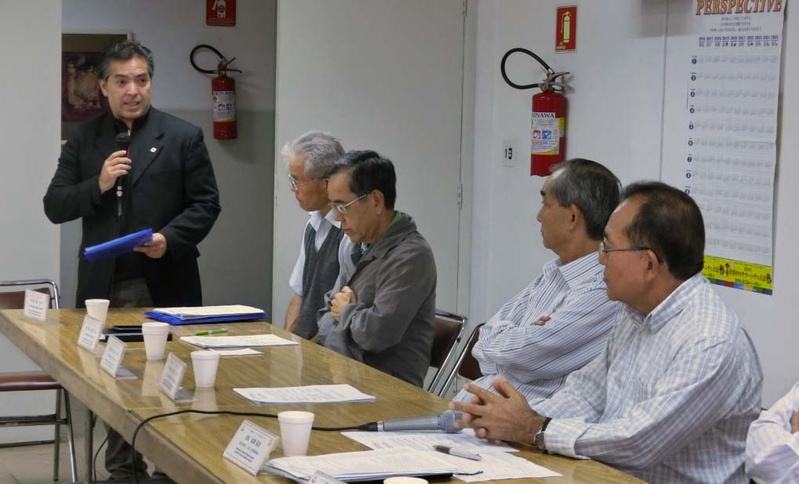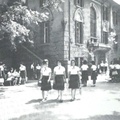Looking Back on History Began in 2000
For the past few years, things have started to move.
Okinawa-born film director Yojyu Matsubayashi has already interviewed ten or more people who had been evicted from Santos and is planning to shoot a documentary film. When he visited the Santos Japanese School in 2016, by chance he found a name list of people who had been evicted, and that’s when he started digging into it. Some of the people he filmed at the time had already passed away. I really hope that he will complete the film, on behalf of the departed.
The biggest movement so far this year is that Brazilian Okinawan kenjinkai (prefectural association) in their regular board meeting on April 19 unanimously agreed to support Okuhara Mario Jun’s lawsuit against the federal government in which he is asking for an apology without compensation for the eviction of Japanese immigrants before and after the war.
Indeed, what triggered this decision was the fact that 60% or more people who were evicted in Santos were Okinawan immigrants and their descendants. As the climate was similar to that of their hometown, many Okinawan people lived near the port of Santos as shipping or fishery workers. When the case was brought up at the board meeting, most people stepped forward, saying their parents or relatives went through it, and the decision was made at once.
The third issue of “Muribushi” (published in October, 2017), a coterie magazine of School of Okinawan Immigrants, published interviews of four people who went through the eviction, together with the name list that director Matsubayashi found.
Of the interviewees, one that touched me the most was the story of the sister of Toyoko Yabiku (age 84, Nisei). When the eviction was ordered, her sister’s husband was not at home. With a fear of not being able to see her husband again, her sister took the two children, threw away all the property she had built and was forced to get on the train leaving for the city of São Paulo.
“The most painful experience for me was that my sister developed a phobia in the shock of the incident and suffered from mental illness for the rest of her life.” (Page 145) It’s the movement asking for an apology with the grudge of an experience like hers multiplied by 6,500.
Before he requested Okinawan kenjinkan for support, Okuhara-san had asked the Brazilian Japanese Culture Welfare Association, a major organization representing the Nikkei community, but had been declined. Since most people who’d had the experience had passed away and with generations of people who don’t know the time back in the days, some people don’t see the need to bring back the past. Going against such movement, Okuhara-san keeps doing what he’s been doing. This seems to remind me of what Kami-san was doing back then.
With Okinawan kenjinkai holding such a strong bond and accounting for 10% of the Nikkei community, they will definitely help request the case to be brought up in the Anistia committee of the Ministry of Justice faster at the 110th anniversary.
With such expectations during the Workers’ Party era, a committee for seeking the truth was established, aiming at finding the extent of the oppression of human rights during the military dictatorship. Following this, a public hearing on the oppression of Japanese immigrants before and after the war was held at the provincial assembly of São Paulo in 2013, and with its content recorded in the committee’s report, in 2015, Okuhara-san took the case to Anistia Committee.
Government Apology in the 1980s in North America and Military Administration in South America
In the United States, President Reagan signed the Civil Liberties Act in August, 1988, and issued a formal apology to Japanese immigrants as well as Nikkei Americans evicted and captured during the WW II and agreed to pay $20,000 to each individual. At the same time, Nikkei Canadians filed a lawsuit for compensation in 1983, and in September, 1988, the Canadian government decided to compensate not only for individuals but also for the Nikkei community.
However, military dictatorship was prevailing in South America from the 1960s to the 80s, and this had not interrupted but rather tamped down the momentum of the democratic to look back on the history. The movement gained momentum around 2000 when left-wing governments were established in many countries.
However, the committee has about 20,000 cases of lawsuits to process, and the ones that are being debated now were filed in early 2000. As Kami-san lost his life this year, many immigrants who lived before the war have passed away as well. In order to win the apology as soon as possible, Okuhara-san is looking for Nikkei organizations willing to support him.
The ceremony of transferring the ownership of Santos Japanese School was held on the very day of Japanese immigration on June 18. Federal congress member Papa who made such effort in the capital as a Brazilian politician gave this comment: “Though it happened during the war, what’s wrong is wrong. This return is a way of recognizing the wrongdoing. I hope that this moment will be a symbol that reminds people to keep passing on the history and build lasting peace together.”
Mayor in the city of Santos, Paulo Alexandre Barbosa, also showed his appreciation for years of people’s efforts. “This is the first chapter of a new history built on justice, equality and respect. Fundamentalism and antiforeignism are prevailing in the world. But the contribution of Japanese people to the foundation of Brazil and their history tells us a lot about thinking of a peaceful future in a multiracial society. This return is the result of cooperative efforts between Japanese immigrants and us.”
This return would not have been possible without the support of Brazilian politicians. It was indeed the “result of cooperative efforts.” The process itself is meaningful.
Isn’t the meaning of the complete return, which was made possible at the 110th anniversary of Japanese immigration to Brazil, to treat foreign immigrants equally and live in peace with them? In order to learn from the wrongdoing from the past, I believe that this history should be thought of seriously all around the world.
© 2018 Masayuki Fukasawa






